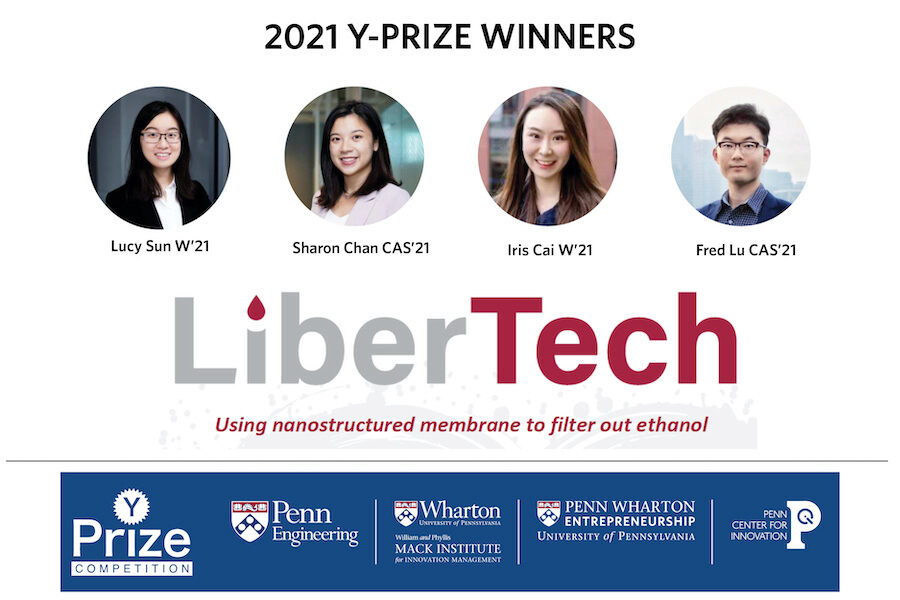With a $23 billion global market for nonalcoholic/low-alcohol beverages, big beer makers and microbrewers alike are interested in tapping into the category. Sales are growing fastest in the United States, with consumers of all ages who want to enjoy high-quality, flavorful drinks while avoiding alcohol for health or religious reasons. LiberTech wants to give them all a reason to raise a glass for a toast.
LiberTech is the 2021 Y-Prize winning team of Shangting (Lucy) Sun W’21, Sharon Ying Man Chan CAS’21, Zhouzheyuan (Fred) Lu CAS’21, and Hechun (Iris) Cai W’21. Along with three other finalist teams, they pitched their dealcoholization idea to judges at the competition’s online finale on April 26, 2021. The Y-Prize annually challenges students to explore taking Penn-developed technologies out of the lab and into the marketplace for the chance to win the $10,000 top prize.
 Current dealcoholization methods are expensive and some processes negatively alter the drink’s taste. To remove the alcohol from the beverage without adulterating flavor, LiberTech wants to use membrane filtration developed by Penn Engineering Professor Chinedum Osuji. The technology allows for the passage of liquids with the goal of separation to be done more precisely and efficiently than other filtration methods.
Current dealcoholization methods are expensive and some processes negatively alter the drink’s taste. To remove the alcohol from the beverage without adulterating flavor, LiberTech wants to use membrane filtration developed by Penn Engineering Professor Chinedum Osuji. The technology allows for the passage of liquids with the goal of separation to be done more precisely and efficiently than other filtration methods.
“Moving forward, we are hoping to use the $10,000 funding to validate our technology and conduct small-scale prototyping and piloting with breweries,” Sharon Chan said. “We are optimistic about this!”
To develop their idea, LiberTech team members say they spent months researching, talking to key opinion leaders, and creating a business case. Their efforts and those of the three other Y-Prize finalist teams were acknowledged by the judges when they announced the winner at the finale.
“Each of the teams chose a market where there’s real need, which made our jobs harder to assess the viability of the application of the Penn technology to those market needs,” said Head Judge Dean Miller, President and CEO, Philadelphia Alliance for Capital and Technologies (PACT). Miller was joined on the panel by Mark G. Allen, Alfred Fitler Moore Professor, Electrical and Systems Engineering, Mechanical Engineering and Applied Mechanics (MEAM), and Inaugural Scientific Director, Singh Center for Nanotechnology; Dawn Eringis, President and CEO, DPE Strategy; Jennifer Hartt, Director of Investments, Ben Franklin Technology Partners of Southeastern Pennsylvania; and Jason Smith, Director, Life Sciences, IP Group.
The following finalists were each awarded $1,500 to continue to pursue their application.
- Invision Med — The team pitched combining semantic SLAM and 3D deep learning techniques (developed in Penn’s General Robotics, Automation, Sensing and Perception Laboratory) to reduce inflammation, standardize performance, and boost lesion/polyp detection accuracy during endoscopy. Team: Aditya Hota (SEAS), David (Zhangyi) Fan (Wharton/SEAS), Catherine Ruan (Wharton/Vagelos LSM), Emma Lu (Wharton/Vagelos LSM), Chloe Niu (Wharton)
- Kerato Technologies — Using nanostructured membrane technology, KeraCoat would shield corneal transplants from immune rejection and democratize global access to clear, long-lasting vision. Team: Shiva Teerdhala (Vagelos LSM), Henry Le (Vagelos LSM), Sireesh Ramesh (Vagelos LSM), Navya Janga (SEAS), Amy Chen (Vagelos LSM)
- Rareflow — The team aims to develop a rare earth element (REE) refining business for the U.S. market using nanofiltration technology to increase supply and production speed. Team: Ben Yao (Wharton), Cooper Yerby (SAS), Patrick Prommel (Wharton), Caroline Dickey (Wharton), Peter Hucal (Wharton)
The LiberTech team members say they all appreciated the competition as an opportunity to build on entrepreneurial skills and, looking ahead, develop a solution with potential real-world impact.
“We definitely want to create something on our own in the long term, and we think the Y-Prize is a first step towards that,” Lucy Sun said.
WATCH: About Nanostructured Membranes
The Y-Prize is sponsored by Penn Engineering, Penn Wharton Entrepreneurship (Venture Lab), the Penn Center for Innovation, and the Mack Institute for Innovation Management.



